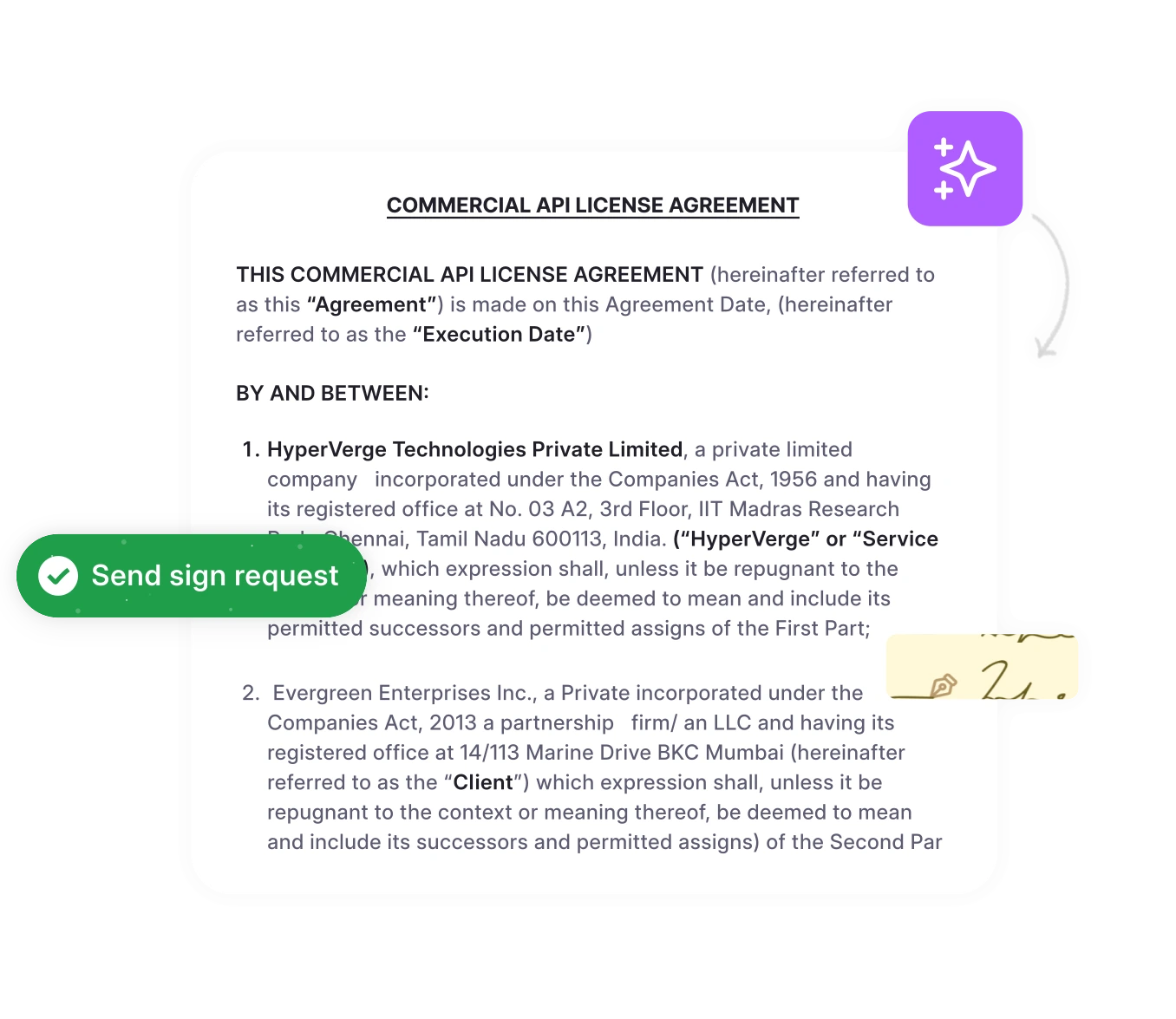Are you unsure how to protect your business from unfavorable contract terms? Is compliance tracking a struggle? Are you worried about hidden risks that could lead to costly disputes?
These pain points highlight the requirement for effective contract review. A thorough review protects your business from potential liabilities.
Conducting a review ensures that every agreement aligns with your business goals. Understanding contract language allows your team to make informed decisions.
Let’s discuss the importance of contract review.
What is contract review?
Contract review is a process that includes a detailed analysis of an agreement’s terms to ensure clarity, fairness, and alignment with your business needs. The purpose of reviewing contracts is to identify potential risks which can be financial liabilities, reputational harm, or compliance issues. This contract review process also helps clarify ambiguous language and address unfavorable clauses that could impact the involved parties.
Recently, LeadSquared chose HyperStart to address its contract challenges. With high volumes of contracts and limited legal resources, this B2B SaaS provider needed a solution that could handle complex workflows. HyperStart’s AI automation reduced review times by 75%, achieving a 60% cut in contract creation time and 6+ hours saved per review.
Receiving an MSA from a major client usually takes legal counsel a considerable amount of time for a thorough review. With HyperStart, we can quickly identify around 20 critical items in a first-cut review. Using HyperStart’s AI review, we get a first cut review in less than 1 minute, reducing the contract review time from 4-6 hours to just 2 hours.

Om Prakash Pandey
Head of Legal at LeadSquared
Why do you need to review contracts?
Here are several reasons why reviewing contracts is important.
1. Reduces financial and legal risks through contract review
Reviewing contracts is a part of contract management that helps identify and reduce potential financial, legal, and reputational risks. By carefully examining each clause, businesses uncover potential pitfalls that could lead to disputes, unexpected costs, or even litigation. For instance, a contract containing vague terms creates liability issues, but a thorough review clarifies these points before signing.
2. Ensures compliance with legal standards in contracts
Regular contract reviews assist businesses to stay in compliance with legal standards and regulations. Not adhering to these requirements results in penalties, missed compliance fines, or lawsuits. By systematically reviewing contracts, businesses meet all necessary legal obligations that reduce the risk of non-compliance.
3. Align contractual agreements with business objectives
A well-conducted contract review ensures that every legal agreement supports the business’s goals and objectives. Businesses ensure contracts align with their strategic objectives to avoid agreements that do not support their overall mission. This alignment builds a more cohesive approach to business operations.
4. Strengthens partnerships by reviewing contracts
Reviewing contracts helps build and maintain solid relationships with partners, clients, and vendors. Clear and fair agreements build trust. Addressing ambiguities at the start helps prevent misunderstandings later on which could lead to disputes. A thorough review shows professionalism and commitment to collaboration which strengthens these crucial partnerships.
Never miss a contract detail again
Say goodbye to tedious reviews and gain clarity to your contracts with speed and precision. Only with HyperStart CLM.
What to look for during a contract review?
Here is what you should focus on during the contract review process to ensure a thorough evaluation of the contract’s key components.
| Contract Components | Purpose of Review | Importance for Business Operations |
| Key Contractual Terms | Review terms related to payment, deliverables, and obligations | Ensures clarity on expectations and responsibilities |
| Compliance Requirements | Check for adherence to relevant laws and regulations | Helps avoid legal issues and ensures compliance |
| Termination Clauses | Assess the conditions under which the contract can be terminated | Protects your interests in case of non-performance |
| Indemnity and Liability | Examine clauses on liability and indemnification | Minimizes potential financial risk |
| Confidentiality Provisions | Ensure confidentiality terms are clear and enforceable | Safeguards sensitive information |
| Dispute Resolution Process | Review how disputes will be handled and resolved | Provides a clear path for conflict resolution |
| Performance Metrics | Look for any key performance indicators (KPIs) defined in the contract | Ensures accountability and performance tracking |
With this information, identifying potential risks and ensuring that the contract aligns with your organization’s strategic goals becomes easier. Let’s discuss the entire contracting process along with a contract review checklist.
A step-by-step contract review process
Conducting a comprehensive contract review involves a systematic approach to ensure all the aspects of the agreements are thoroughly evaluated. Check out this step-by-step process of reviewing your agreements along with the contract review checklist.
1. Assess the contract’s purpose and scope
The first step begins with the evaluation of the overall purpose of the contract. This involves understanding the key objectives and ensuring all the stakeholders involved are effectively identified. Having a well-defined purpose and scope results in successful agreement which also minimizes misunderstandings later on.
Checklist for a contract assessment:
Is the purpose of the contract clearly defined?
Are all parties accurately identified?
Does the scope align with your business goals and expectations?
2. Identify and verify key contractual terms
Focus on reviewing important terms within the contract. This step involves assessing the clauses related to payment, deliverables, and obligations to ensure clarity and accountability. Understanding these key terms helps prevent disputes and establishes clear expectations for all parties.
Checklist for key terms and clauses:
Are payment amounts, schedules, and methods specified?
Are the conditions under which the contract can be terminated outlined?
Are the confidentiality expectations clear and enforceable?
Are liabilities and indemnification terms defined?
When reviewing contracts, look for vague and unclear terms that invite interpretation like “reasonable efforts” or “as soon as possible.” Replacing these with specific commitments ensures clarity.
3. Conduct a compliance and legal check with your legal team
Verify that the contract complies with the relevant laws and regulations. Collaborating with your legal team and attorney helps confirm that the contract adheres to industry standards and legal requirements. This approach minimizes the risk of non-compliance issues that result in penalties or legal disputes.
Checklist for compliance:
Are all relevant laws and industry regulations considered?
Are necessary licenses and permits included?
Is the jurisdiction for legal disputes clearly defined?
4. Review financial and operational obligations
Ensure that the financial and operational obligations outlined in the contract are feasible and clearly defined. This step includes analyzing payment schedules, deliverable timelines, and performance metrics to confirm that they align with the company’s capabilities and expectations.
Checklist for financial and operational review:
Are financial obligations realistic and clearly stated?
Are deadlines for deliverables and payments clearly outlined?
Are performance expectations and metrics defined?
5. Evaluate potential risks and liabilities
After review, identify potential risks associated with the contract and document strategies for mitigation. This step involves analyzing the agreement for possible vulnerabilities, outlining risk management strategies, and ensuring that processes for handling disputes are articulated properly.
Checklist for risk assessment:
Are all potential risks identified?
Are procedures for resolving disputes outlined?
Are strategies in place to mitigate identified risks?
6. Finalize approvals and secure documentation
Conclude the process by ensuring that the executed contract is stored securely. This final step includes reviewing the agreement for accuracy, obtaining final contract approvals from stakeholders, and integrating secure storage methods to retrieve the contract for future reference.
Checklist for final approval and documentation:
Have all required approvals been obtained?
Is the contract stored securely for easy access in the future?
Are any amendments to the contract documented?
Go from contract chaos to control
Automate redlining, reduce contract TAT by 80% and focus on real growth. Only with HyperStart CLM.
Streamline your contract review process with HyperStart
Performing contracts review protects businesses from unnecessary risk and ensures agreements support your goals. A structured and systematic review strengthens partnerships and prepares your company for growth. A thorough contract review adds long-term value to every agreement by focusing on clear terms and compliance.
HyperStart is a contract automation software that simplifies this contract review by automating key checks and extracting vital data. Contract review automation transforms your workflow by reducing time spent on manual checks and enhancing accuracy in every agreement.
If you want to improve your contract review process and save valuable time, try HyperStart today. Schedule a demo to see how our AI-driven platform streamlines your contract management.
Get a first-cut review in seconds
Reclaim time, simplify contract compliance, and put contract intelligence to work for you at scale.












